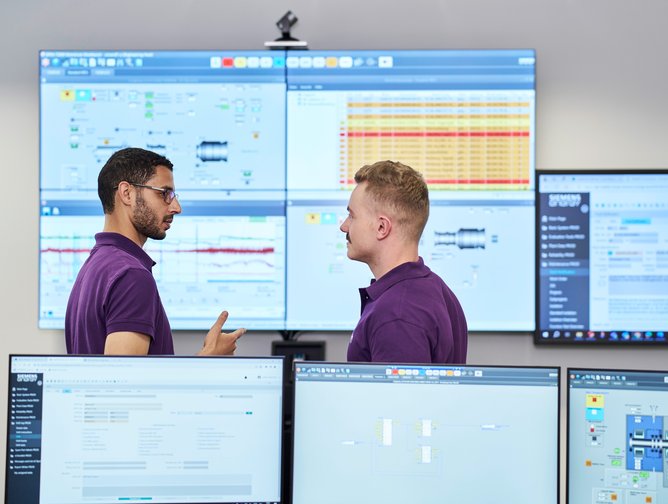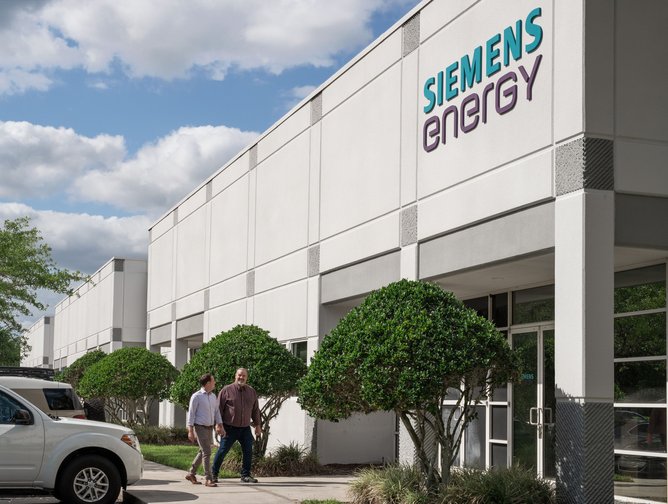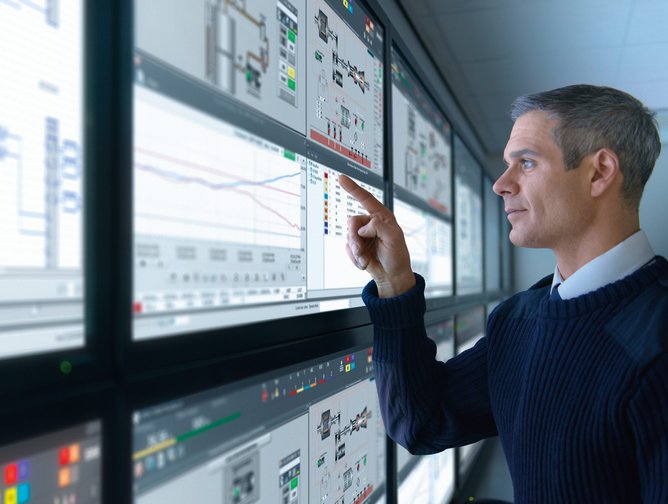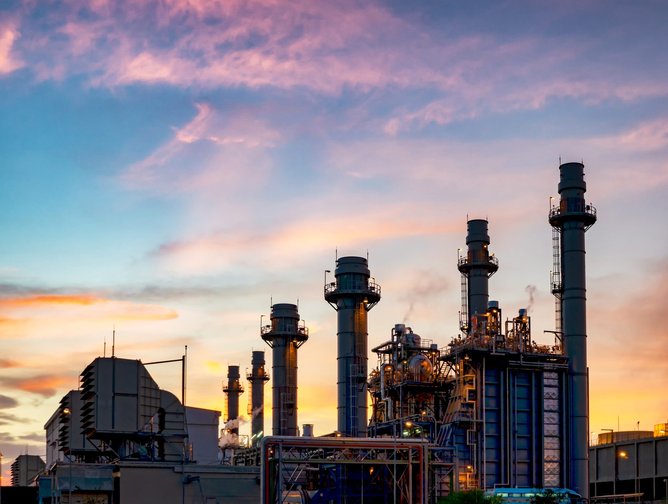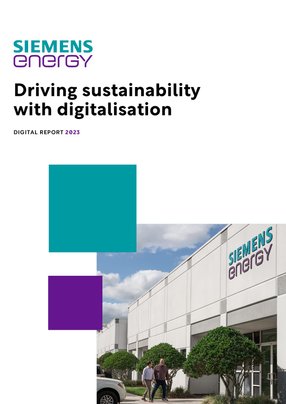Siemens Energy driving sustainability with digitalisation
For more than 150 years, engineers at Siemens Energy – one of the world’s leading energy technology companies – have been spearheading the electrification of the world.
The company works with its customers and partners on energy systems for the future, supporting the transition to a more sustainable world. With its portfolio of products, solutions and services, Siemens Energy covers almost the entire energy value chain – from power generation and transmission to storage.
“Our mission is to support companies and countries with what they need to reduce greenhouse gas emissions and make energy reliable, affordable, and more sustainable,” describes Simona Rossetti, Senior Vice President within Siemens Energy’s Gas Services Business, who first joined the company’s energy business in 2003.
In 2020 Siemens Energy was founded as an independent company, opening a new chapter in Siemens’ extensive history of energy technology. Its aim today is to energise society.
“An estimated one-sixth of the electricity generated worldwide is based on technologies from Siemens Energy,” Rossetti says. “Today we are a team of 94,000 sharing the same passion, vision, and values. Our diversity makes us strong and helps us to find answers together with our partners.”
Digitalisation and decarbonisation
Describing it as our greatest challenge, energy transition poses a number of questions: first and foremost how to reduce greenhouse emissions while also increasing energy supply. “It is an uphill battle, and there is no silver bullet,” Rossetti says. “But finding solutions has always been in our DNA.”
Digitalisation can contribute to decarbonisation in several ways, firstly by making energy production more efficient, meaning the same amount of electricity can be produced with less fuel and fewer emissions.
“Secondly, digitalisation helps to integrate renewable energy sources into the grid by managing power flows, balancing supply and demand, and optimising energy storage,” Rossetti says. “For example, digital control systems such as Omnivise T3000 can help manage the intermittency of solar and wind power by predicting energy output and adjusting supply accordingly.”
Integrated data management is another solution that supports decarbonisation. “Integrating operations and engineering data can enable engineers to do their jobs more efficiently,” Rossetti says. “Overall, digitalisation can enable the optimisation of energy and resource use, reduce fuel consumption, and promote sustainable practices, contributing to decarbonisation efforts.
Digitalisation boosting efficiency in power generation
Digitalisation is a potent tool to enhance efficiency in power generation. Siemens Energy offers a number of solutions from their Omnivise portfolio, engineered to refine maintenance operations within power plants and foster predictive maintenance strategies.
The company’s Omnivise Asset Management (OAM) offering is a modern software suite combining deep domain know-how, the latest technologies and methods, and modern software design to support plant personnel.
An example of these capabilities can be seen in the operations of one of Latin America's largest electricity suppliers, which manages a vast fleet of diverse power generation assets – ranging from fossil to renewable sources. The company, in a bid to trim Operational Expenditures (OPEX) across its maintenance and operations, wanted to introduce a remote expert centre at its headquarters.
“The OAM software forms the central technical backbone to deliver critical services to their entire fleet of assets,” Rossetti says. “Our solution will enable the customer to reduce operational costs while increasing reliability and availability of key assets at 23 power plants.”
With OAM, Siemens Energy also supports broader use cases from remote operator rounds and inspections all the way to autonomous plants. As Rossetti describes, to reach this milestone there are a number of challenges for plant operators to overcome.
“The growing percentage of renewable energy sources in the grid is steadily increasing the pressure on gas power plants to operate more flexibly and efficiently. A massive shortage of skilled control room and maintenance personnel is also looming on the horizon.”
Ultimately, the vision of power plants that operate autonomously is about to become a reality, with increasing advanced technologies increasing the efficiency of the plant itself but also of the plant operators.
“Developers are now taking the next step towards autonomy by fine-tuning digital twins, data analyses, and AI to provide smart forecasts and instructions.
“Autonomy doesn’t start with the autopilot. Long before that, power plants are supported by smart analyses, smart forecasts, smart recommendations, and smart instructions,” Rossetti comments.
“AI-supported analysis algorithms regularly filter out signs of irregularities from the data supplied by cameras, microphones, and other sensors mounted on the plant or installed on robots, and that request support when needed. Off-site maintenance and control room personnel can support several power plants simultaneously.”
Digital control systems helping manage new challenges in the energy industry
The energy landscape is changing and the number of renewable energy sources is growing steadily. With that comes pressure on fossil-fueled power plants to operate more flexibly and efficiently. Digital control systems such as Omnivise T3000 from Siemens Energy can help to manage these new challenges.
This system with its SCADA functionality is capable of managing a variety of different decentralised energy resources including wind offshore, automated, autonomously and in a coordinated way, ensuring reliable 24/7 operation.
“At the same time, it is flexible and scalable to support a larger number of assets when needed,” says Rossetti. “Omnivise T3000 is the perfect solution not only for fossil power generation and renewables, but also for large and mid-size microgrids, such as IPPs, islands, industries, data centres and mines.”
Together with German utility MVV, Siemens Energy has built and recently put into operation a large-scale heat pump plant at the GKM power plant in the city of Mannheim. The plant uses river water as a heat source, helping to replace a coal-fired power plant.
This new heat pump will be a major contributor to MVV and the City of Mannheim’s goals to become CO2 neutral in heating production by 2030. The facility is expected to supply district heating for 3,500 households and save some 10,000 tonnes of carbon emissions per year.
“Our proven Omnivise T3000 control system integrates the control of the new heat pump and an existing thermal storage into the existing GKM power plant,” Rossetti explains. “The control system uses its multi-unit functionality to manage multiple generation units from a central control room.”
Using data insights to unlock new opportunities to decarbonise
A powerful tool to improve operational efficiency and reduce emissions is harnessing the power of data. Integrating operations and engineering data enables engineers to do their jobs more efficiently, while data scientists and modelers use this integrated data to predict the future.
One good example of this, Rossetti describes, is Siemens Energy’s Omnivise Energy Management solution. “Power producers also have the challenge to sell their energy most profitable. Every day, they have an increasingly complicated decision to make: How can I plan the dispatch of my assets to satisfy market demand, but in the most beneficial way?”
For dispatchers with combined-cycle power plants this question is challenging. The introduction of renewables like solar and wind can create wider fluctuations in demand for dispatchable energy from traditional power producers.
“When solar and wind are available, they are prioritised on the grid,” Rossetti explains. “This situation leads to shorter market intervals for power generated by fossil-fueled plants. These dispatchers now must access and understand weather data to know when neither wind nor solar will be available, and they will need to fill the generation gap in a cost-efficient way.”
Aimed at solving this problem, Siemens Energy’s Omnivise Energy Management solution combines the power of AI-driven forecasting and predictive asset models. “With Omnivise Energy Management our customers are able to do rapid multi-dimensional or multi-branch scenario simulations and create day-ahead and short-term future generations plans that are economically optimised to the plant’s circumstances,” Rossetti says.
Ensuring the safety and security of control systems and customer data
As part of critical infrastructure, plants in the energy market must fulfil more stringent requirements than ever before. With the risk of cyber-attacks, this means looking beyond operational concerns and protecting plants against hacker attacks – and documenting compliance according to a wide range of legal requirements.
As Rossetti describes, thanks to built-in security and Siemens Energy’s comprehensive cybersecurity portfolio, Omnivise T3000 is ideally suited to help operators protect their infrastructure.
“We provide long-term support so you can rely on a system that is always up to date,” she comments. “We support current hardware on a long-term basis and provide tried-and-tested security patches for software at any time during operation. For our customers, this means long-term security with no downtime.”
One of Rossetti’s most significant career achievements, she describes, has been the spearheading of Siemens Energy’s Cyber Security Operation Center (cSOC) in Germany to help organisations defend against and resolve cyberattacks 24/7.
“The energy sector has become a primary target for cyber-attacks,” she says. “Collaborating with my dedicated team, I saw the need to develop cybersecurity services that could be seamlessly integrated into our customers' contracts and help them when confronting the growing cyber threats they are exposed to. To meet this need, I took the initiative to establish a Cyber Security Operation Center (cSOC) for our European customers from the ground up.
“This undertaking allowed us to promptly respond to an emerging trend and fulfill a critical customer requirement with our cyber protection, detection, and monitoring solutions. I am proud of our ability to identify a new industry trend and swiftly create effective solutions to address it.”
The energy transition relies on seamlessly connecting physical assets with digital technologies to foster innovation, reduce emissions, and improve efficiency, but this future depends on strong cybersecurity across the whole supply chain. Siemens Energy’s Managed Detection and Response (MDR) solution provides scalable protection against disruptive cyberattacks in the energy sector using innovative AI. “It defends critical infrastructure against cyberattacks, helping protect communities around the world from supply chain disruptions,” comments Rossetti.
Siemens Energy partners with Amazon Web Services (AWS) to quickly collect and analyse large volumes of data to monitor for cyber threats, giving energy sector chief information security officers (CISOs) the power to detect and uncover attacks before they execute. “These secure cloud capabilities that can integrate digital applications and leverage sensitive data – such as real-time monitoring and detection – add an important and cost-effective tool to the defensive arsenal for CISOs and industrial security analysts.”
A wide range of collaborative partnerships
Siemens Energy is collaborating with numerous companies around the world, from the marine sector to hydrogen production, from eFuels to heavy industries. “We are working on open innovation with customers, industrial partners, universities, and research centres like the Karlsruher Institut für Technologie (KIT) in Germany, the Georgia Institute of Technology in the US and the University of Cambridge in the UK.”
As Siemens Energy invests in growth and optionality, it has engaged in partnerships with a number of ventures: including joining the AWS Partner Network as a Technology Partner to provide customers with industrial cybersecurity, analytics and data storage solutions and partnering with Air Liquide on building a sustainable hydrogen economy in Europe.
“At Siemens Energy, our innovation strategy is not just about technology and products. It is about empowering people and partners, both within the company and outside of it, to accelerate progress on the journey to net-zero,” Rossetti says.
“We strive to create a culture and framework where individuals and teams can take ownership of innovation and bring new concepts to market with the goal of better serving our customers and becoming the world’s premiere energy.
“Partnerships represent a key step in helping the power industry drive toward a more sustainable, profitable future and in offering our customers a more efficient solution for their business.”
The importance of inclusion and diversity in energising society
Every day, people are treated less favorably or face discrimination because of their ethnicity, gender, religion or ideology, disability, age, or sexual identity. As Rossetti explains, this has to change.
“Siemens Energy believes inclusion and diversity creates more opportunity for success. It doesn’t matter the gender, age, ethnic background, sexual orientation, or disability - everyone has an equal part to play in energising society. Here, more than 94,000 employees worldwide join forces with welcoming colleagues who encourage equality and belonging, to passionately and energetically pursue a shared goal: to shape the energy systems of the future.”
With the energy industry playing a crucial role in addressing climate change and reducing carbon emissions, there has never been a more important time to make positive change.
“The world needs people who do not look the other way when they see or hear racism and discrimination. We can all do a great deal in our everyday lives and at work to make our society more supportive, open, and tolerant.
“At Siemens Energy, we believe that creating a society worth living in involves demonstrating solidarity and creating an environment in the here and now that not only leaves room for diverse identities and lifestyles but also sees them as an enrichment to our lives,” Rossetti concludes. “If we all work together toward this goal, nothing less than great things can come of it – for us, for the future, for all of us.”
